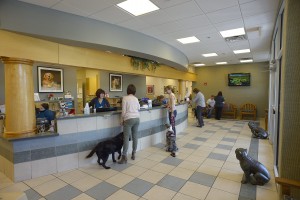Americans love animals. Most American households have at least one pet. 49.5% of U.S. households have one or more dogs, and another 30% have cats. And, of course, there are plenty of families out there with more unusual pets—fish, ferrets, rabbits, hamsters, guinea pigs, birds, and other exotics. But most animal lovers don’t just think about cuddles, belly rubs, walks, playtime, selecting nutritious food, and scheduling regular veterinary visits for their pets. They also think about the welfare of animals outside of their own homes!
 If you love animals and want to make a difference in the lives of dogs and cats, it’s easier than you think. Most animal shelters are constantly in need of additional funds, so a donation to a local animal rescue group around the holidays, or whenever you can spare it, can go a great way toward helping animals.
If you love animals and want to make a difference in the lives of dogs and cats, it’s easier than you think. Most animal shelters are constantly in need of additional funds, so a donation to a local animal rescue group around the holidays, or whenever you can spare it, can go a great way toward helping animals.
A donation of time is also invaluable. If your pet-loving children need community service hours, why not suggest a local shelter or animal charity? A few hours cleaning litter boxes, taking dogs for walks, or playing with attention-needing animals is always a very rewarding experience. And, if your children are younger, you could always suggest sponsoring a classroom pet and offer to help out with food and supplies, as public schools are always on a tight budget these days. For animal lovers like you, teaching the next generation about the importance of proper animal care is a fantastic idea!
If you’re looking to teach values or volunteer a bit closer to home, there might be opportunities in your own neighborhood. Elderly people may not be able to walk their own dogs as often as they’d like to, or bend down to brush their cats, so volunteering in that capacity helps animals in need, as well as aiding your community.
Perhaps the biggest commitment you can make to helping animals in need is adopting a new animal from a shelter or rescue. Most shelters are overcrowded with animals, and especially older animals. While puppies and kittens always seem to find a good home, dogs and cats a few years past their most adorable age often languish in shelters. It’s a shame, because there are many advantages to adopting an older animal! Older cats typically don’t require litter box training, and older dogs often know how to walk on a lead or wait to go outside to use the bathroom.
They’re also a bit less spirited, which can be nice for families who don’t want to risk scratched curtains, couches, and hands—or torn-up pillows and frequent wake-ups to take a puppy outside in the night. Older animals are often on their second chance, and can be so excited to find a new “forever home” that they go through a second puppy or kittenhood, so even if you want a rambunctious new companion, an older animal may provide you with just that!
We are a specialty veterinary healthcare center in Malvern that loves animals as much as you do. We are open 24 hours a day, 7 days a week, 365 days a year, so give VRC a call at (610) 647-2950.






 Email
Email If you love animals and want to make a difference in the lives of dogs and cats, it’s easier than you think. Most animal shelters are constantly in need of additional funds, so a donation to a local animal rescue group around the holidays, or whenever you can spare it, can go a great way toward helping animals.
If you love animals and want to make a difference in the lives of dogs and cats, it’s easier than you think. Most animal shelters are constantly in need of additional funds, so a donation to a local animal rescue group around the holidays, or whenever you can spare it, can go a great way toward helping animals.

